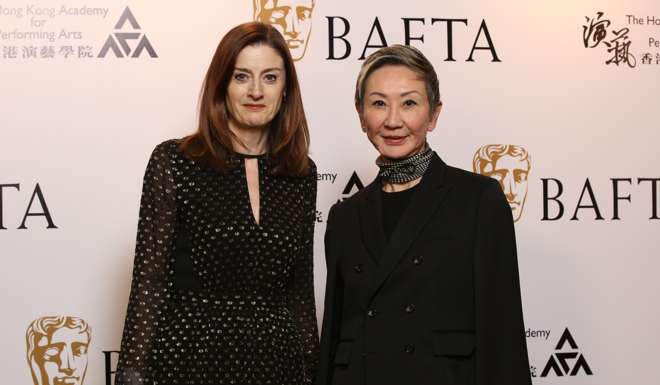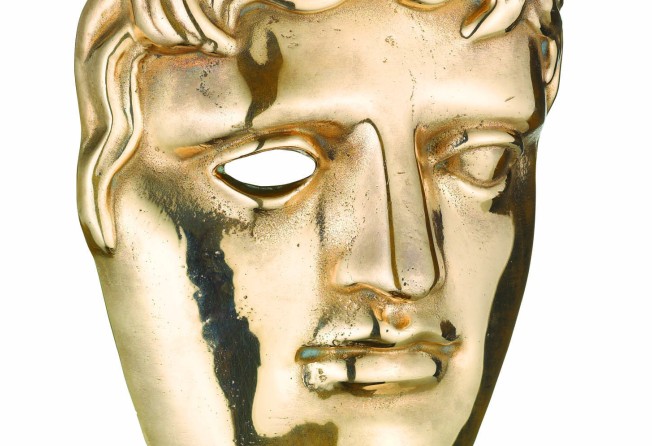
Amanda Berry explains Bafta’s China focus, and why its awards precede the Oscars
The CEO of the British Academy of Film and Television Arts (Bafta) wants screens, big and small, to tell a global story

From 1947 to 2000 there was one woman who served as chair of Bafta. Since you became CEO in 2000 there have been three, was that deliberate?
I’m really proud of the number of women involved in Bafta. The majority of my staff is female, and I’d love to say it was a deliberate decision, but they are genuinely the best people for the jobs. We have incredibly talented women, but I’ve never stopped to think about it before, which means I’ve probably taken it for granted!
Is it important to you to have women on staff?
I think it’s always really good to have a gender mix in any organisation. Because, whilst people can share skills, it’s a mix of personalities that is incredibly important. I’m very grateful I’m a woman, because I’ve felt throughout my career that I was able to say in meetings: “I just have a feeling about this; I have a gut feeling about this.” Often, I feel men don’t feel able to say that. But as a woman, particularly in the creative industry, you’re allowed to have feminine intuition.
Bafta has been bringing masterclasses to Hong Kong and China through the Bafta in Asia programme, which started in 2013. Why now, and why Hong Kong and China?
This goes back to 2006, when we did three days of celebrating Bollywood movies, and we brought over the biggest Bollywood stars – like Aamir Khan and Shah Rukh Khan – and the reaction in London was just amazing. People were seeing films they wouldn’t normally be seeing, they were seeing the work of directors, producers, and actors they didn’t know. The following year we thought: “That Bollywood event worked brilliantly, we would love to do the same in China.” Then we discovered it was really hard to get films and people to come to the UK. So that idea got parked. As the years went by, we became much more aware of what’s happening in Hong Kong and China, and our industry was becoming increasingly global, and we thought we had to put China back on our radar. A big part of what Bafta does, above and beyond the awards, is our new talent activity. And I genuinely feel that new talent coming into our industry have to understand the global industry. It’s no longer just about the UK and Hollywood. That’s why we were so keen to launch scholarships between the UK and China, and to be doing these events here.

What do you envision next for Bafta in Asia?
The exciting thing about this relationship between Bafta and Asia is that there are so many opportunities. The opportunities are immense, and I just want to make sure that each event we do, we can do it really well and add value. I’m also very keen on adding the number of scholarships. We currently have two Chinese students studying in the UK. I’d like us to have a lot more, I think that creates that creative and cultural exchange. And I’d like to have students from the UK studying in China.
Unlike the Oscars, Bafta has a Rising Star award for emerging talent. Tell us about this award.
The Bafta Rising Star Award has been my priority over the past 10 or so years. We’re in a unique position as Bafta, because we’re the only ones to represent films, television and games; no other academy in the world does that. What we do, which is very special, is a scheme called Breakthrough Brits, which Burberry supports, we’re in year four now and there are between 15 to 20 Breakthrough Brits across film, television and games, and we look after them for a year. We find out the people they’d really like to meet and we make sure they meet them; or where they feel their skills are lacking and we pair them up with someone who can help them. We’re starting to have a whole generation of talent who are part of the Bafta family. Already, we’re seeing Breakthrough Brits from the first year supporting those in year fourth. So, already, that family is looking after and supporting each other. I’m still waiting for the Breakthrough Brits marriage, I feel that’s to come!
How did Bafta escape the controversy that was #OscarsSoWhite?
Our nominations are more diverse than the Oscars, and actually, our membership is also more diverse.
The exciting thing about this relationship between Bafta and Asia is that there are so many opportunities
How did you ensure it’s more diverse?
We made changes. Until now, to apply for Bafta membership, you had to be proposed and seconded by Bafta members. And we looked at this and thought it made it into “it’s who you know” that allows you to get on in the industry. So we removed that.
Do filmmakers and the film industry have a responsibility to drive the conversation about diversity and promote it? What is Bafta doing about it?
Starting from 2019, to be eligible for the Outstanding British Film and Outstanding Debut by a British Writer, Director or Producer categories, it must have passed diversity standards. Which isn’t just about ethnicity, but also about gender, disability, sexuality, social-economic background, and so on. We’re starting with just the British film categories, but wouldn’t it be nice to see this rolled out internationally? So, let’s hope.
If people think the only way into our industry is knowing someone and living and working in London, that limits the people in the industry. And we have to tell the stories of our world, and we can only do that if people from all backgrounds have the chance to get into the industry.
Also, we have something in the UK called Bafta Crew for people behind the cameras at the start of their career, and it’s all about networking and helping them meet people and promote their work. It’s really important to not only say: “We need to make this change” and then not help make that change.
What inspires you?
What really inspires me is that with some people, no matter how high they fly, they remain incredibly humble, and if you ask them to be mentors, most say “yes”.
I’ve been at Bafta for 16 years, and quite often I think: “I’ve been here way too long, I really need to leave.” But then I think: “How many jobs are there that with everyday, tangible things are happening?” I still have dreams for the organisation, and my challenge is I have to fit everything I want to achieve into a day.
Speaking of fitting everything in, what’s your go-to bag?
I have to have a lot of evening bags, because I do a lot of red carpet events. You see people walk down the red carpet with tiny little bags, and I’m not one of those people who can do that. Because I have my phone, cards, and probably the schedule for the event, I’m an asthmatic so I have my inhaler and epi pen ... So, my go-to bag is a Burberry clutch that can just fit everything I need to put in it perfectly but still be elegant enough to be an evening bag.
In 2002, you moved the Bafta awards up to February, just before the Oscars. What prompted that decision?
When I joined Bafta the film and television awards had just been separated. It took Bafta 12 years of discussions to separate them, because they didn’t think the film awards would survive without the television awards. So, the film awards were in April, just after the Oscars, because they were part of the television awards. And, quite frankly, who cared? There’s a window in which the world is interested in films, and that window is between the Golden Globes and the Oscars. But films open so much later in the UK than in the US, so we spent two years convincing US studios that if they give us prints of the films that we’d make sure members could see them. It was quite a big move at the time, but it has absolutely paid off, because it’s become a truly global event. We’re always two weeks before the Oscars, and everyone knows that’s Bafta’s slot.